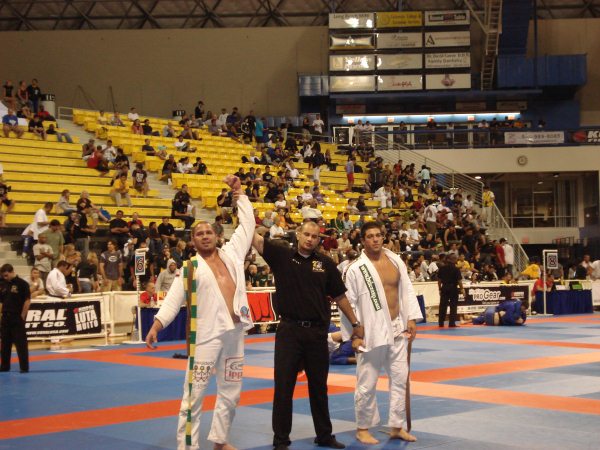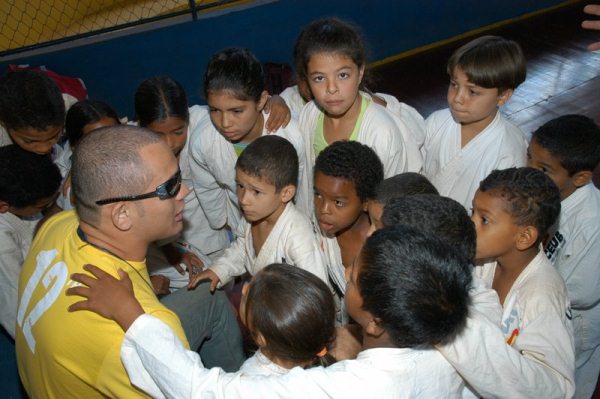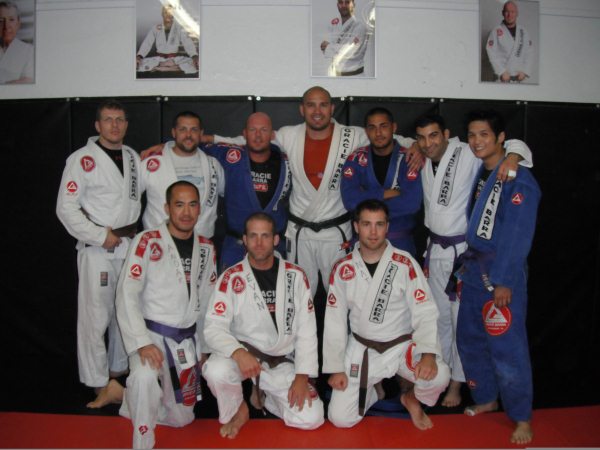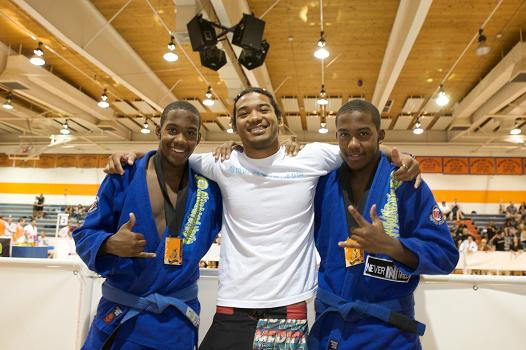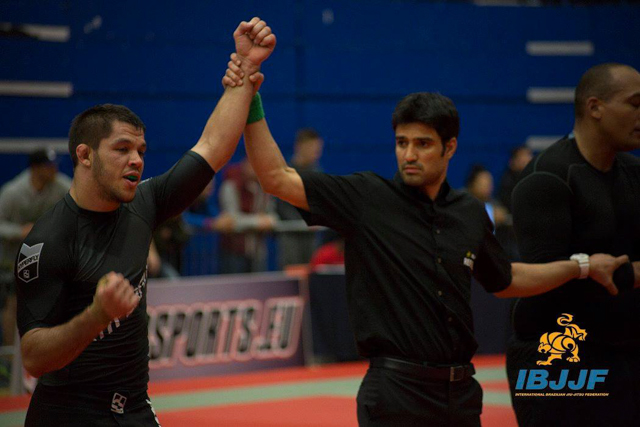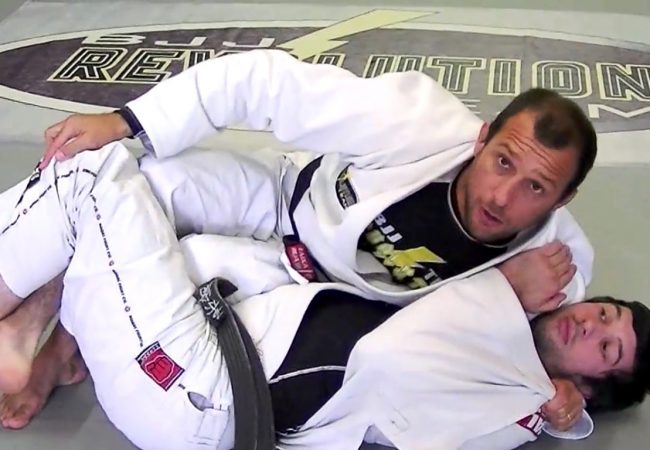Rodrigo Carvalho was raised in the heart of the Amazon. He was born in the state of Roraima in Boa Vista, Brazil, which is located in the extreme north of Brazil and on the border of Venezuela and Guiana. It’s about seven hours to Manaus, where many of the greatest Jiu-Jitsu fighters hail from.
Growing up, Rodrigo was a very tall and skinny kid. He played a variety of sports like basketball, swimming, and soccer, but jokes that he was never very good at any of them. In 1994, when Rodrigo was 14, his sister’s boyfriend, who was from Manaus, came to live in his city, and invited him to train Jiu-Jitsu. At that time, Jiu-Jitsu was a martial art he had not heard of, but one he was curious to explore.
In his first class he found that he was able to use his long arms and legs effectively and seemed to have a knack for the sport. He began training with professor Pascoal Duarte, who was the Gracie Barra representative in Roraima. “He gave me my first stripe on my white belt and through the years, as I moved up through the ranks, I also received my black belt from him in 2007,” Rodrigo says.
Rodrigo took to Jiu-Jitsu so fast, he began training and competing regularly. “I would often compete in Manaus since it’s close to my city,” Rodrigo says, “I grew up fighting and watching great fighters like Bibiano Fernandes, Xande Ribeiro and Saulo Ribeiro.” As a blue belt he had the difficult task of having to fight Ronaldo Jacaré and Leopoldo Montenegro. “I didn’t have an easy time fighting at the beginning of my career, but then again, neither did they!” Rodrigo laughs.
Rodrigo believes that “guys from the north” of Brazil have good, strong Jiu-Jitsu; better than most. It may have something to do with the severe weather conditions there. “It’s so hot and humid because of the rainforest,” Rodrigo says, “When you train at noon, it’s like 42 degrees Celsius (about 107 degrees Fahrenheit). It’s brutal. When the guys from the north compete in other areas, they don’t get tired because they’ve trained in such extreme conditions.”
The weather must have done something right for Rodrigo because from 1998 to 2002, which he calls “the height of my career,” he only lost one match in his state in five years, and that was to Jacaré. “It was a great, great fight,” Rodrigo recalls, “It was May 14, 1998, and I was in the open division final with him. He won, but it was a great fight for both of us.”
In 2001, Rodrigo won the Worlds as a blue belt in the heavyweight division. His state had never had a world champion in any sport before. “I fought five fights and only had two points scored on me the whole time,” Rodrigo says, “I got the first gold medal for my state and was so proud to be the first person to bring it home.”
In 2002, Rodrigo moved to Brasilia, which is the capital of Brazil, to begin a Physiotherapy degree. “I met and started training with a lot of great people, all of whom were purple belts at the time,” Rodrigo says, “Alexandre “Dande”, Roberto “Tussa”, Rafael “Barata” and all the guys from GB Brasilia.”
In 2004 Rodrigo and Dande started a social project in Favela, the poorest town in Brasilia. “We started a program allowing everyone in Favela, including children 5 years old and up, free Jiu-Jitsu lessons. In the beginning, Dande and I thought we were crazy because we had no money to run the program. I didn’t have a vehicle, so I had to take the bus there and he only had an old motorcycle that he would end up pushing because he would always run out of gas!” Rodrigo laughs.
However, they loved Jiu-Jitsu and believed so thoroughly it would help keep the people in Favela from a life of crime, gangs, and drugs; they were determined to see it through. “In one year we got 200 students. We showed our project to the owner of our UniCEUB University,” Rodrigo says, “He was so amazed and proud of our work he gave us both school scholarships. Dande and I were able to save money after that. I bought myself a motorcycle, so I wouldn’t have to take the bus anymore and Dande could afford gas!”
The owner of the university was so pleased with the project; he also bought gi’s, and paid for their travel expenses and entry to competitions for all the kids in the program. “We made a lot of kids champions,” Rodrigo says, “Including one student who won the Worlds in LA in 2007. She had never flown anywhere in her life. Then she goes to LA and wins the Worlds!” Rodrigo says the project is still going on today and he is still in contact with everyone involved in it.
In November 2005, Rodrigo was a brown belt when the South Brazil Nationals took place in Florianopolis. Dande and Tussa invited him to fight, but he had no money or time to train, so he initially refused the offer. Dande told him he didn’t need to train because there wouldn’t be many people in his division, so he’d only have a couple of matches. He also assured him that he would help with money, so Rodrigo happily accepted the offer, not knowing that Dande had no money either!
On the day they left for the tournament, Rodrigo discovered that Dande had $150 for both of them to eat, drink, and buy gas for three days. Dande, Tussa, two other friends, and Rodrigo crammed into a small car and drove non-stop for 15 hours to the tournament, as they had no money for a hotel. “We ate a lot of chips, gum, chocolate, and convenience store food since that’s all we could afford,” Rodrigo recalls smiling.
Rodrigo says Tussa was not the greatest driver and decided to pass a car in a prohibited area right in front of a highway patrolman. “We got pulled over and had to give half our trip money to the police officer to let us off the hook,” he says, “But in spite of the fact we had no money or food left, we all competed in the tournament and proudly came home with medals around our necks.”
In 2006 Dande and Tussa asked Rodrigo to go to LA with them to compete in the Pan, and move there with them to teach Jiu-Jitsu. “I declined their invitation because I hadn’t completed my schooling yet,” Rodrigo says, “One year later I went back to LA with a student of mine to compete and again Dande asked me to stay. At the time I only had four months of university left, so again, I refused the offer and returned to Brazil, completing my education in 2007.”
After graduation, Rodrigo returned to his hometown of Boa Vista and began working 12-14 hours a day, 7 days a week. “This was necessary to make a decent living and to be comfortable,” Rodrigo says, “I had no time to train or teach Jiu-Jitsu and I became sad because I missed and loved it so much. In 2008 a friend of mine was in a car crash and died right in front of me. I became very depressed and started to think about what I wanted for my life, and what would make me happy. I picked up the phone, called Dande and said, ‘I’m going to LA.’”
Rodrigo sold everything he owned, quit his two jobs, and booked a plane ticket. He came to LA in June 2009 and moved in with Dande. “He taught me all about the GB systems and programs,” Rodrigo says, “I was surprised at how big the Jiu-Jitsu organizations were in America.”
In 2009 Rodrigo went to visit a friend in Canada. He went to GB Vancouver and started training there. “I met Tim Shears, owner of GB Vancouver and many other wonderful people of whom are now close friends of mine,” Rodrigo says, “Tim invited me to stay in Vancouver to train and help out with his team. I thought the city was beautiful and the people were nice. I knew the winters were cold, but didn’t mind because I became addicted to snow boarding. I could see myself living there.”
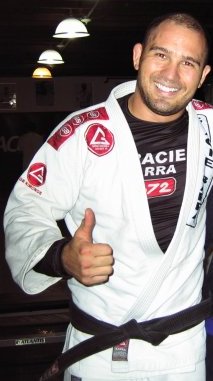 Last summer Rodrigo applied for his work visa and stayed in Vancouver while the process took place. In May 2010, he got a letter from immigration stating his work visa was accepted. “I’m so excited!” Rodrigo says, “My plan is to help Tim open more GB gyms in Vancouver, to make it one of the biggest Jiu-Jitsu cities in Canada. I also want to return to physiotherapy and work in intensive care with premature babies; a job that I love.”
Last summer Rodrigo applied for his work visa and stayed in Vancouver while the process took place. In May 2010, he got a letter from immigration stating his work visa was accepted. “I’m so excited!” Rodrigo says, “My plan is to help Tim open more GB gyms in Vancouver, to make it one of the biggest Jiu-Jitsu cities in Canada. I also want to return to physiotherapy and work in intensive care with premature babies; a job that I love.”
Rodrigo says he wants to spend the rest of his life in Vancouver. “I have a great quality of life here and find pleasure in each day again,” he says, “I know I will find happiness in Canada.”
Rodrigo is grateful to many people for their support along the way: his parents and family, his professor, Pascoal Duarte, and his “brother” Dande for always making him laugh. “I’m thankful that Master Carlos put Jiu-Jitsu on the map and provided opportunities for coaches to travel to America to teach it and have their lives change for the better,” Rodrigo says, “And I’m thankful to Tim Shears for giving me the opportunity to expand GB Jiu-Jitsu in Canada.”


